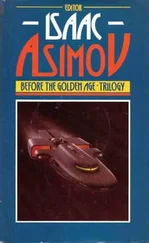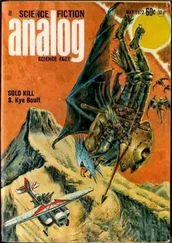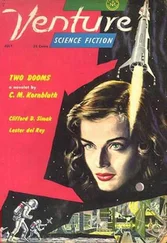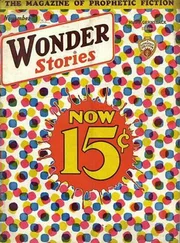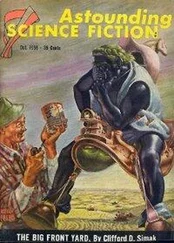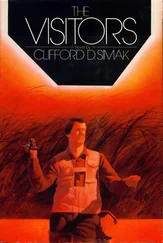Clifford Simak - The World That Couldn't Be
Здесь есть возможность читать онлайн «Clifford Simak - The World That Couldn't Be» весь текст электронной книги совершенно бесплатно (целиком полную версию без сокращений). В некоторых случаях можно слушать аудио, скачать через торрент в формате fb2 и присутствует краткое содержание. Жанр: Фантастика и фэнтези, на английском языке. Описание произведения, (предисловие) а так же отзывы посетителей доступны на портале библиотеки ЛибКат.
- Название:The World That Couldn't Be
- Автор:
- Жанр:
- Год:неизвестен
- ISBN:нет данных
- Рейтинг книги:4 / 5. Голосов: 1
-
Избранное:Добавить в избранное
- Отзывы:
-
Ваша оценка:
- 80
- 1
- 2
- 3
- 4
- 5
The World That Couldn't Be: краткое содержание, описание и аннотация
Предлагаем к чтению аннотацию, описание, краткое содержание или предисловие (зависит от того, что написал сам автор книги «The World That Couldn't Be»). Если вы не нашли необходимую информацию о книге — напишите в комментариях, мы постараемся отыскать её.
The World That Couldn't Be — читать онлайн бесплатно полную книгу (весь текст) целиком
Ниже представлен текст книги, разбитый по страницам. Система сохранения места последней прочитанной страницы, позволяет с удобством читать онлайн бесплатно книгу «The World That Couldn't Be», без необходимости каждый раз заново искать на чём Вы остановились. Поставьте закладку, и сможете в любой момент перейти на страницу, на которой закончили чтение.
Интервал:
Закладка:
"Dead center," Duncan assured himself.
He worked the mechanism and the spent cartridge case flew out. The feeding mechanism snicked and the fresh shell clicked as it slid into the breech.
He lay for a moment, watching. And on the knoll where the thing had fallen, the grass was twitching as if the wind were blowing, only there was no wind. But despite the twitching of the grass, there was no sign of the Cytha. It did not struggle up again. It stayed where it had fallen.
Duncan got to his feet, dug out the bandanna and mopped at his face. He heard the soft thud of the step behind him and turned his head. It was the tracker.
"It's all right, Sipar," he said. "You can quit worrying. I got it. We can go home now."
 t had been a long, hard chase, longer than he had thought it might be. But it had been successful and that was the thing that counted. For the moment, the vua crop was safe.
t had been a long, hard chase, longer than he had thought it might be. But it had been successful and that was the thing that counted. For the moment, the vua crop was safe.
He tucked the bandanna back into his pocket, went down the slope and started up the knoll. He reached the place where the Cytha had fallen. There were three small gouts of torn, mangled fur and flesh lying on the ground and there was nothing else.
He spun around and jerked his rifle up. Every nerve was screamingly alert. He swung his head, searching for the slightest movement, for some shape or color that was not the shape or color of the bush or grass or ground. But there was nothing. The heat droned in the hush of afternoon. There was not a breath of moving air. But there was danger—a saw-toothed sense of danger close behind his neck.
"Sipar!" he called in a tense whisper, "Watch out!"
The native stood motionless, unheeding, its eyeballs rolling up until there was only white, while the muscles stood out along its throat like straining ropes of steel.
Duncan slowly swiveled, rifle held almost at arm's length, elbows crooked a little, ready to bring the weapon into play in a fraction of a second.
Nothing stirred. There was no more than emptiness—the emptiness of sun and molten sky, of grass and scraggy bush, of a brown-and-yellow land stretching into foreverness.
Step by step, Duncan covered the hillside and finally came back to the place where the native squatted on its heels and moaned, rocking back and forth, arms locked tightly across its chest, as if it tried to cradle itself in a sort of illusory comfort.
The Earthman walked to the place where the Cytha had fallen and picked up, one by one, the bits of bleeding flesh. They had been mangled by his bullet. They were limp and had no shape. And it was queer, he thought. In all his years of hunting, over many planets, he had never known a bullet to rip out hunks of flesh.
He dropped the bloody pieces back into the grass and wiped his hand upon his thighs. He got up a little stiffly.
He'd found no trail of blood leading through the grass, and surely an animal with a hole of that size would leave a trail.
And as he stood there upon the hillside, with the bloody fingerprints still wet and glistening upon the fabric of his trousers, he felt the first cold touch of fear, as if the fingertips of fear might momentarily, almost casually, have trailed across his heart.
 e turned around and walked back to the native, reached down and shook it.
e turned around and walked back to the native, reached down and shook it.
"Snap out of it," he ordered.
He expected pleading, cowering, terror, but there was none.
Sipar got swiftly to its feet and stood looking at him and there was, he thought, an odd glitter in its eyes.
"Get going," Duncan said. "We still have a little time. Start circling and pick up the trail. I will cover you."
He glanced at the sun. An hour and a half still left—maybe as much as two. There might still be time to get this buttoned up before the fall of night.
A half mile beyond the knoll, Sipar picked up the trail again and they went ahead, but now they traveled more cautiously, for any bush, any rock, any clump of grass might conceal the wounded beast.
Duncan found himself on edge and cursed himself savagely for it. He'd been in tight spots before. This was nothing new to him. There was no reason to get himself tensed up. It was a deadly business, sure, but he had faced others calmly and walked away from them. It was those frontier tales he'd heard about the Cytha—the kind of superstitious chatter that one always heard on the edge of unknown land.
He gripped the rifle tighter and went on.
No animal, he told himself, was unkillable.
Half an hour before sunset, he called a halt when they reached a brackish waterhole. The light soon would be getting bad for shooting. In the morning, they'd take up the trail again, and by that time the Cytha would be at an even greater disadvantage. It would be stiff and slow and weak. It might be even dead.
Duncan gathered wood and built a fire in the lee of a thorn-bush thicket. Sipar waded out with the canteens and thrust them at arm's length beneath the surface to fill them. The water still was warm and evil-tasting, but it was fairly free of scum and a thirsty man could drink it.
The sun went down and darkness fell quickly. They dragged more wood out of the thicket and piled it carefully close at hand.
Duncan reached into his pocket and brought out the little bag of rockahominy.
"Here," he said to Sipar. "Supper."
The native held one hand cupped and Duncan poured a little mound into its palm.
"Thank you, mister," Sipar said. "Food-giver."
"Huh?" asked Duncan, then caught what the native meant. "Dive into it," he said, almost kindly. "It isn't much, but it gives you strength. We'll need strength tomorrow."
 ood-giver, eh? Trying to butter him up, perhaps. In a little while, Sipar would start whining for him to knock off the hunt and head back for the farm.
ood-giver, eh? Trying to butter him up, perhaps. In a little while, Sipar would start whining for him to knock off the hunt and head back for the farm.
Although, come to think of it, he really was the food-giver to this bunch of sexless wonders. Corn, thank God, grew well on the red and stubborn soil of Layard—good old corn from North America. Fed to hogs, made into corn-pone for breakfast back on Earth, and here, on Layard, the staple food crop for a gang of shiftless varmints who still regarded, with some good solid skepticism and round-eyed wonder, this unorthodox idea that one should take the trouble to grow plants to eat rather than go out and scrounge for them.
Corn from North America, he thought, growing side by side with the vua of Layard. And that was the way it went. Something from one planet and something from another and still something further from a third and so was built up through the wide social confederacy of space a truly cosmic culture which in the end, in another ten thousand years or so, might spell out some way of life with more sanity and understanding than was evident today.
He poured a mound of rockahominy into his own hand and put the bag back into his pocket.
"Sipar."
"Yes, mister?"
"You were not scared today when the donovan threatened to attack us."
"No, mister. The donovan would not hurt me."
"I see. You said the donovan was taboo to you. Could it be that you, likewise, are taboo to the donovan?"
"Yes, mister. The donovan and I grew up together."
"Oh, so that's it," said Duncan.
He put a pinch of the parched and powdered corn into his mouth and took a sip of brackish water. He chewed reflectively on the resultant mash.
He might go ahead, he knew, and ask why and how and where Sipar and the donovan had grown up together, but there was no point to it. This was exactly the kind of tangle that Shotwell was forever getting into.
Half the time, he told himself, I'm convinced the little stinkers are doing no more than pulling our legs.
Читать дальшеИнтервал:
Закладка:
Похожие книги на «The World That Couldn't Be»
Представляем Вашему вниманию похожие книги на «The World That Couldn't Be» списком для выбора. Мы отобрали схожую по названию и смыслу литературу в надежде предоставить читателям больше вариантов отыскать новые, интересные, ещё непрочитанные произведения.
Обсуждение, отзывы о книге «The World That Couldn't Be» и просто собственные мнения читателей. Оставьте ваши комментарии, напишите, что Вы думаете о произведении, его смысле или главных героях. Укажите что конкретно понравилось, а что нет, и почему Вы так считаете.

